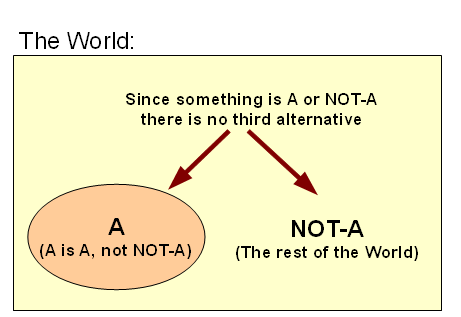Let’s propose a silly example, that a certain Emperor (maybe, just before he went out in his new invisible clothes) decides that a certain crooked stick is now the standard of length, straightness, uprightness and accuracy, a crooked yardstick. Suddenly, what is genuinely such things will be deemed the opposite. And then, suppose that somehow he and his publicists persuade the general public to accept the new standard. Will they not then find that those backward fuddy duddies that hold up their old yardsticks are ignoramuses and obstacles to progress and harmony?
Are we then locked into a war of competing imposed definitions and redefinitions? (That would for sure be a manipulator’s paradise.)
That’s where a plumb-line might help:

Here, we see something that is naturally straight and upright, which will then clearly correct the crooked yardstick. It will even vindicate the fuddy duddies, even though the progressives won’t like it.
So, now, let us lay on the table a key concept: there are self-evident first truths (including inescapably true claims) that can and do serve as plumb-line tests for various truth claims. And thus, such truths can allow us to sift through various worldview or ideological alternatives and schools of thought. Which then allows us to think, decide and act with greater soundness.
For simple example the Josiah Royce proposition, E = error exists, is undeniably true. To see that, try to deny it, ~E. That in effect claims it is error to propose E. So E must be true.
Is this a trivial result?
No, as E is an example of self-evident truth, of truth, of objectively warranted truth (thus knowledge), indeed of truth warranted to undeniable certainty (thus certain knowledge). Such immediately sweeps away radical skepticism, relativism and subjectivism, as well as a raft of linked common notions.
Likewise, for any distinct A — say, a bright red ball on a table — we see that the world can be dichotomised W = {A|~A} thus showing the triple first principles of right reason, Identity, Non Contradiction and Excluded Middle:

Here, A is itself in light of its particular distinct characteristics. No x in W can be both A and ~A. Any x in W will be A or else ~A. These laws are inescapably certain, indeed, any argument to object to them must rely on distinct identity and its corollaries to make an intelligible point. A classic case in point is a remark by St Paul:
1 Cor 14: 7 Yet even lifeless things, whether flute or harp, when producing a sound, if they do not produce distinct [musical] tones, how will anyone [listening] know what is piped or played? 8 And if the [war] bugle produces an indistinct sound, who will prepare himself for battle? 9 So it is with you, if you speak words [in an unknown tongue] that are not intelligible and clear, how will anyone understand what you are saying? You will be talking into the air [wasting your breath]! [AMP]
This is again, hardly a trivial result. Ever so much of the modern skepticism towards reasoned thought pivots on dismissiveness towards precisely these three laws of thought. Where, BTW, Quantum Physicists rely on just these laws in order to do their work.
Similarly, if we look at the world partition W = {A|~A} we see that A is itself, a unit distinctly different from the complex unity ~A, thus we find unity and duality. Where too the partition is empty and there is nothing in W but outside A and ~A, thus, nullity. This sets up the natural numbers, integers, rationals, reals, continuum, and even by using vector rotation, complex numbers. That is a non-trivial consequence.
Likewise, identity and the logic of being allow us to see how inductive reasoning and causality can be grounded.
So, too, as arguably there are self-evident, plumb-line moral truths, moral forms of radical skepticism, relativism and subjectivism, as well as a raft of linked common notions are also swept away. This re-opens the issue of intelligible laws of our morally governed nature, framing thought, speech, behaviour and law. Indeed, Cicero is back:
—Marcus [in de Legibus, introductory remarks,. C1 BC]: . . . the subject of our present discussion . . . comprehends the universal principles of equity and law. In such a discussion therefore on the great moral law of nature, the practice of the civil law can occupy but an insignificant and subordinate station. For according to our idea, we shall have to explain the true nature of moral justice, which is congenial and correspondent [36]with the true nature of man. We shall have to examine those principles of legislation by which all political states should be governed. And last of all, shall we have to speak of those laws and customs which are framed for the use and convenience of particular peoples, which regulate the civic and municipal affairs of the citizens, and which are known by the title of civil laws.
Quintus [his real-life brother]. —You take a noble view of the subject, my brother, and go to the fountain–head of moral truth, in order to throw light on the whole science of jurisprudence: while those who confine their legal studies to the civil law too often grow less familiar with the arts of justice than with those of litigation.
Marcus. —Your observation, my Quintus, is not quite correct. It is not so much the science of law that produces litigation, as the ignorance of it, (potius ignoratio juris litigiosa est quam scientia) . . . . With respect to the true principle of justice, many learned men have maintained that it springs from Law. I hardly know if their opinion be not correct, at least, according to their own definition; for “Law (say they) is the highest reason, implanted in nature, which prescribes those things which ought to be done, and forbids the contrary.” This, they think, is apparent from the converse of the proposition; because this same reason, when it [37]is confirmed and established in men’s minds, is the law of all their actions. They therefore conceive that the voice of conscience is a law, that moral prudence is a law, whose operation is to urge us to good actions, and restrain us from evil ones. They think, too, that the Greek name for law (NOMOS), which is derived from NEMO, to distribute, implies the very nature of the thing, that is, to give every man his due. [–> this implies a definition of justice as the due balance of rights, freedoms and responsibilities] For my part, I imagine that the moral essence of law is better expressed by its Latin name, (lex), which conveys the idea of selection or discrimination. According to the Greeks, therefore, the name of law implies an equitable distribution of goods: according to the Romans, an equitable discrimination between good and evil. The true definition of law should, however, include both these characteristics. And this being granted as an almost self–evident proposition, the origin of justice is to be sought in the divine law of eternal and immutable morality. This indeed is the true energy of nature, the very soul and essence of wisdom, the test of virtue and vice.
So, then, are we willing to acknowledge the problem of crooked yardsticks and the value of plumb-line, self-evident truths in our thinking, arguing, deciding and doing? END